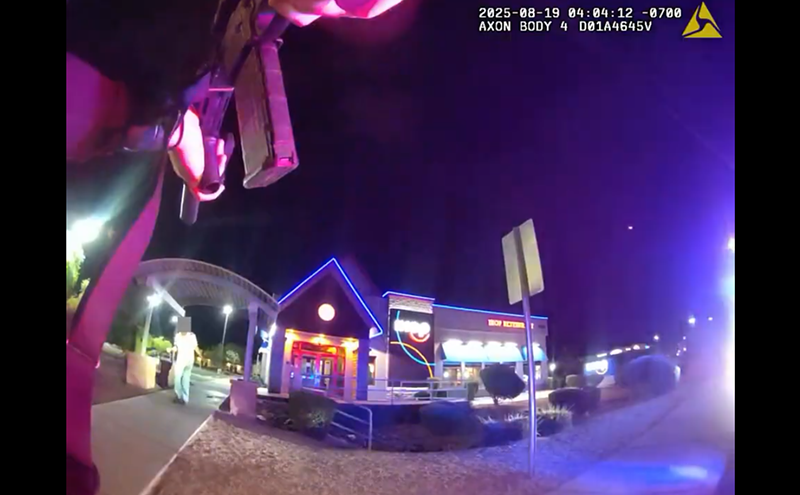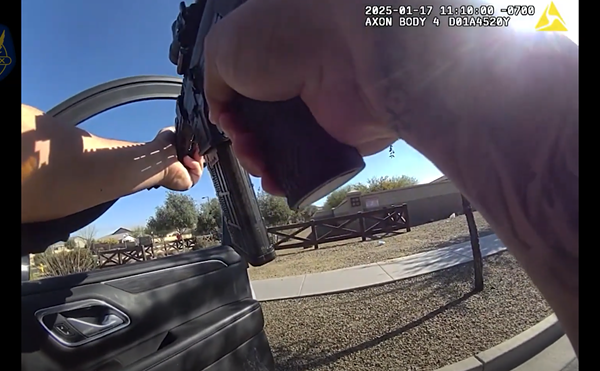Guadalupe Torres held her head in weathered hands.
Tears trickled between her fingers.
In a world with a God, your children do not die before you.
But Guadalupe's son, Felix, did, in fact, pass over.
He was 47.
Abuela Guadalupe is that saddest of women.
No faithless husband ever inflicted pain this intense upon her.
In April, she pulled back the gauze on a wound that never will heal. She spoke of her boy.
A grandchild handed a visitor a small bottle of water as the tragedy unraveled in words around the kitchen table.
Felix Torres routinely bicycled to work. To keep his eye on traffic, he pedaled with cars coming toward him.
Mesa police stopped him on September 30, 2013.
The cops believed he should have moved with traffic, which common sense tells you is more dangerous.
But the law is not a negotiable thing . . . nor is it forgiving. As these things do, the stop because of a bicycle violation deteriorated quickly.
Torres was taken to Maricopa County Sheriff Joe Arpaio's jail when Mesa police discovered he had outstanding warrants for driving without a license and failure to appear in court.
SEE ALSO:
• COVERAGE OF JOE ARPAIO'S DECADES OF MISDEEDS
• ARPAIO'S CULTURE OF CORRUPTION AFFECTS EVERYONE IN MARICOPA COUNTY
During the stop, police discovered that Torres was in possession of a drug pipe as well as an empty baggie containing meth residue.
Once in jail, the sheriff's detention officers and medical staff needlessly and carelessly killed Felix Torres.
Here, in greater Phoenix, families live the Day of the Dead all year long with the Sheriff's Office. Here, families cry with regrets instead of exchanging sugar skulls.In Maricopa County, the Dia de los Muertos calls for burials, not celebrations.
Since Arpaio was elected in 1992, government records show that the county has paid out claims against the sheriff totaling more than $74 million.
This does not include legal expenses, which, for example, in the ACLU's ongoing Melendres racial-profiling lawsuit against Arpaio, includes another $44 million in estimated cost.
In this context, Felix Torres is not just another dead Mexican. In fact, he's not one of the poor migrants Sheriff Arpaio abused; he's American born and American dead.
Felix Torres is one example of the viciousness our sheriff has embraced. Arpaio became "America's toughest sheriff" by bragging about the brutality in his jails. At the beginning of his reign in 1995, the sheriff told a national magazine that "jail is not supposed to be fun. It's supposed to be punishment." And that he, Arpaio, "educates through punishment."
Felix's mother, Guadalupe, has sued Joe Arpaio for $3.25 million over the education that killed her son.
We have seen a parade of corpses, a seemingly endless procession of cadavers taken out of Sheriff Arpaio's jail as he shuffles the calacas into eternity.
This isn't racism. The jailers kill all races.
Which isn't to say that Arpaio's office isn't full of crackers.
In the groundbreaking lawsuit, still in the courts, the ACLU has held the sheriff responsible for racial profiling as his deputies patrolled the Valley of the Sun. Federal Judge G. Murray Snow agreed with the allegations and found Arpaio guilty. Furthermore, the sheriff now faces contempt-of-court charges for defying Judge Snow. But racial profiling is only one moving part in what a Valley attorney alleges in pleadings is a "culture of cruelty."
The ACLU lawsuit was filed in 2007.
Eight years later, litigation continues.
Reform, such as it is, is judicially glacial.
And in all that time, the brutality in the jail kept pace.
Of course, the sheriff and his deputies set out to harass brown people at home, on the street, in their cars, and while they worked. That's been proven, litigated, and admitted to in court.
Furthermore, these deputies notoriously passed around virulently racist jokes about Mexicans in their e-mails.
What do you think happens when these badges get their hands on scofflaws, the unlicensed, the behind in child support, the ne'er-do-wells, the mentally ill, the petty and the felonious, the indigent, the drug dependent?
Chaotic hell.
That's what happens.
Doesn't matter what race you are. And it doesn't really matter whether you're Mexican or American.
Felix Torres' story was important enough that Sheriff Joe Arpaio — a lawman with a four-person public relations department always in overdrive — filed papers seeking a gag order from the courts to prevent any journalist from talking about this death and, more specifically, to silence the family's principal attorney, Michael Manning.
The sheriff is notorious for his press stunts with Hollywood has-beens like Pamela Anderson and Steven Seagal. The doors of the jail are thrown open for the press for staged dramas with celebrities.
Just don't inquire of the sheriff about the bodies carted out of his cells.
The courts refused to gag anyone in the Torres case; but this doesn't mean people aren't walking on eggs.
The perpetrators know that Felix Torres died in agony, died slowly, and died in front of witnesses. The perpetrators know that you don't get to kill those who have lost their way because of drugs.
But the knowledge is merely a legal tangent.
To understand this story, you must listen to Abuela Guadalupe.
Born in Mesa, Felix Torres was one of those kids who grew up and stayed at home with his mom and family. His aunt lived down the street. Little kids gravitate to the Torres residence; yet the children do not seem underfoot.
Guadalupe never moved a single item in Felix's bedroom after he died in jail in 2013.
It's as if he might walk in the door — at any moment.
The Catholic statues in his bedroom are more a reflection of familial devotion than a statement about Felix. He was not particularly religious. But he was deferential to his mom's belief. He may have smoked meth, but this is not the home of a meth-head.
A plush red pillow rests on his bed with the word "Love" stitched across the surface. Inexplicably, a bust of Minnie Mouse smiles over the bed. A Dallas Cowboys blanket rests neatly atop the quilt.
On his nightstand, a box of Kleenex waits near Felix Torres' funeral card.
"He was a great guy," says Guadalupe. She then adds something important to her: "He did a lot for the kids."
Then she thought of her Felix's childhood.
"He loved school. Even when he was sick, he would not stay home. He was also really into sports: football, baseball. He liked to play electric guitar, you know, Pink Floyd, Led Zeppelin, Lynyrd Skynyrd.
"He never married. He had girlfriends because he was a very good-looking guy."
Felix Torres worked as a cement finisher. It is the family trade. All the men are cement finishers.
"I raised him by myself, three girls and Felix," remembers Guadalupe. "He really got along with his sisters. He would do magic tricks for them, for anyone who would pay attention.
"When he got older, he played bingo and keno. He would bicycle to the bus stop and take the bus to Gila River or Wild Horse Pass [casinos]."
When he wasn't working, Torres spent time on the Internet.
"He liked UFO stories," says his mother. "He was always on the computer. He'd call me to come look at UFOs.
"He liked to help the neighbors with their cars." Then, she puts her head down.
The tears come again.
Guadalupe has been in a wheelchair for 30 years (because of injuries suffered in a motorcycle accident), and now she slumps into her seat, trying to settle her grief.
"I just miss him."
In their reply, Sheriff Arpaio's attorneys repeat phrases of denial and responsibility. The phrases thud through page after page.
The sheriff's papers conclude that the real culprit is Felix Torres.
"To the extent [Torres] suffered injuries and damages, they were caused or contributed to, in whole or in part by the negligent, reckless, criminal or otherwise wrongful acts of [Torres]," or others.
What Felix Torres did was ride a bike in the wrong direction.
He might have possessed a drug pipe, but that is not what killed him. Torres' autopsy showed just trace elements of meth.
On April 17, Dr. Todd R. Wilcox, who served as medical director of Sheriff Joe Arpaio's jail from 2004 through 2006, commented upon Torres' death in 2013:
"It is my professional medical opinion . . . that if the detention staff on duty during the 12 hours before Mr. Torres death had taken the appropriate steps . . . Mr. Torres would not have died."
The statement is true, as far as it goes.
The statement, however, misses the agony of Mr. Torres.
He did not go quietly.
He was not among us one moment and, then, simply gone the next.
He lingered.
On October 3, the sheriff's medical team sent Torres to the Maricopa Medical Center, the county hospital, to have a hernia addressed.
The sheriff's medical staff also gave Torres a 60 milligram shot of Toradol.
Following treatment of the hernia at the hospital, he was transferred back to the jail with an explicit written warning from the hospital: "Please return to the nearest Emergency Dept if your symptoms worsen, or if you experience any chest pain, problems breathing, fever greater than 105.5 F, chills, nausea, vomiting, abdominal pain, weakness, abnormal swelling, severe headaches, or other concerning symptoms."
Despite Torres' suffering, several of these symptoms were ignored by Arpaio's jailers and by the jail's medical staff.
Shortly after returning from the hospital to the jail, Torres was in trouble.
When he was booked into the jail, he'd told staff that he had a history of ulcer problems.
When you research Toradol, the drug the sheriff's medical staff gave to Torres, one of the first things you find is that Toradol is not to be given to someone with ulcers.
That shot of Toradol, given by the sheriff's medical staff, fatally aggravated Torres' predisposition to acute ulcer complications, according to the dead man's lawyers.
By the time Torres returned to jail from the hospital, he was experiencing vivid and extreme pain in reaction to the Toradol.
"The injection caused an ulcer to develop and perforate," wrote the family's attorneys, Michael Manning and Larry Wulkan of Stinson Leonard Street law firm.
Felix's family and attorneys argue that the Toradol promptly promoted, or aggravated, an ulcer that ate through Torres' stomach, killing him.
One witness thought Felix Torres died vomiting his own excrement.
Others described the rancid smell, the blood regurgitated onto the floor of a cell.
Witnesses who watched Felix Torres die told lawyers what they saw.
"Felix was constantly walking with his hands wrapped around his abdominal area complaining of severe pain and that he was not getting any help. He also complained that he couldn't use the restroom or eat anything," Pedro Robles said.
"The night of his death, it seemed like he couldn't breathe," remembered Khaliq Le'Ron Thomas.
"I remember that Felix was sick almost from the moment he arrived," noted Victor Faustino Rivera. "He cried a lot . . . Felix kept trying to get the guards' attention and begging for help. They mostly ignored him . . . They did take him to see a nurse at one point, but they brought him back, and he was still in pain."
"[Felix] was asking for help and the guard . . . cursed him and told him to stop acting like that. Then [the guard] came to my cell door and tried to joke about Felix's antics," said Randy Phillip Jerrells.
"Felix talked to a detention officer who told him to drink water, lie down, and fill out a Tank order . . . I remember a detention officer telling me that medical would see Felix in a couple of days after they received a Tank order for him.
"I helped carry Felix to a medical facility on one occasion . . . They told him he should take Tums and Tylenol," recalled Jarrod Whatley.
"On the night Felix died, he asked for help from multiple detention officers. I distinctly remember Felix telling the detention officers that he was dying . . . One detention officer . . . cussed at Felix saying, '[You're] fucking faking it,'" noted Brandon Obrect.
"Felix was banging on his cell door and asking for help . . . A detention officer came by and said something like, ' I'm not going to deal with this. You're bullshitting . . . Stop that racket and go to sleep.'
"Felix begged, 'Please sir, please,'" remembered Rickey V. Owens.
The guard ignored him.
Not once in Felix Torres' agony did jailers, nurses, or doctors return him to the hospital as the emergency room had instructed.
About 11 p.m. on October 5, a guard discovered Torres slumped in his cell. Unconscious.
They called "man down" and used a defibrillator on him while they began chest compressions.
But the inmate with a known history of ulcers already was gone.
Felix Torres, arrested September 30, was pronounced dead shortly after midnight, October 6, 2013.
Like almost everyone in Arpaio's jail, Torres was poor.
These are the people our sheriff brags about humiliating and brutalizing. Their suffering is a campaign prop:
• Sheriff Joe Arpaio's detention officers and the jail's medical staff ignored Felix Torres' medical history of ulcers.
• The sheriff's medical staff gave Torres a drug you do not give to someone with a predisposition to ulcers.
• The sheriff's jailers and medical staff ignored directions from the hospital emergency room to return Torres if problems developed.
• Sheriff Joe Arpaio's staff ignored Torres' deteriorating condition until the man was dead.
"I was here at home getting ready for church," Guadalupe Torres recalled. "Two detectives from the Sheriff's Office came to the front door. At first, I didn't know who they were.
"They told me Felix passed away.
"I went to my room. I couldn't talk to them anymore. They talked to my oldest daughter."
For a moment, Guadalupe Torres was quiet with her own thoughts.
Then she added: "I didn't know he'd been arrested."
Today, a wall in the home of Guadalupe Torres has photos of Felix as a little boy.
In the backyard of the Torres home, there is a small wooden shed.
Inside the shed, the blue bicycle Felix Torres pedaled before going to jail hangs on a wall.
The bike and a few photos are all that is left of Felix Torres.












